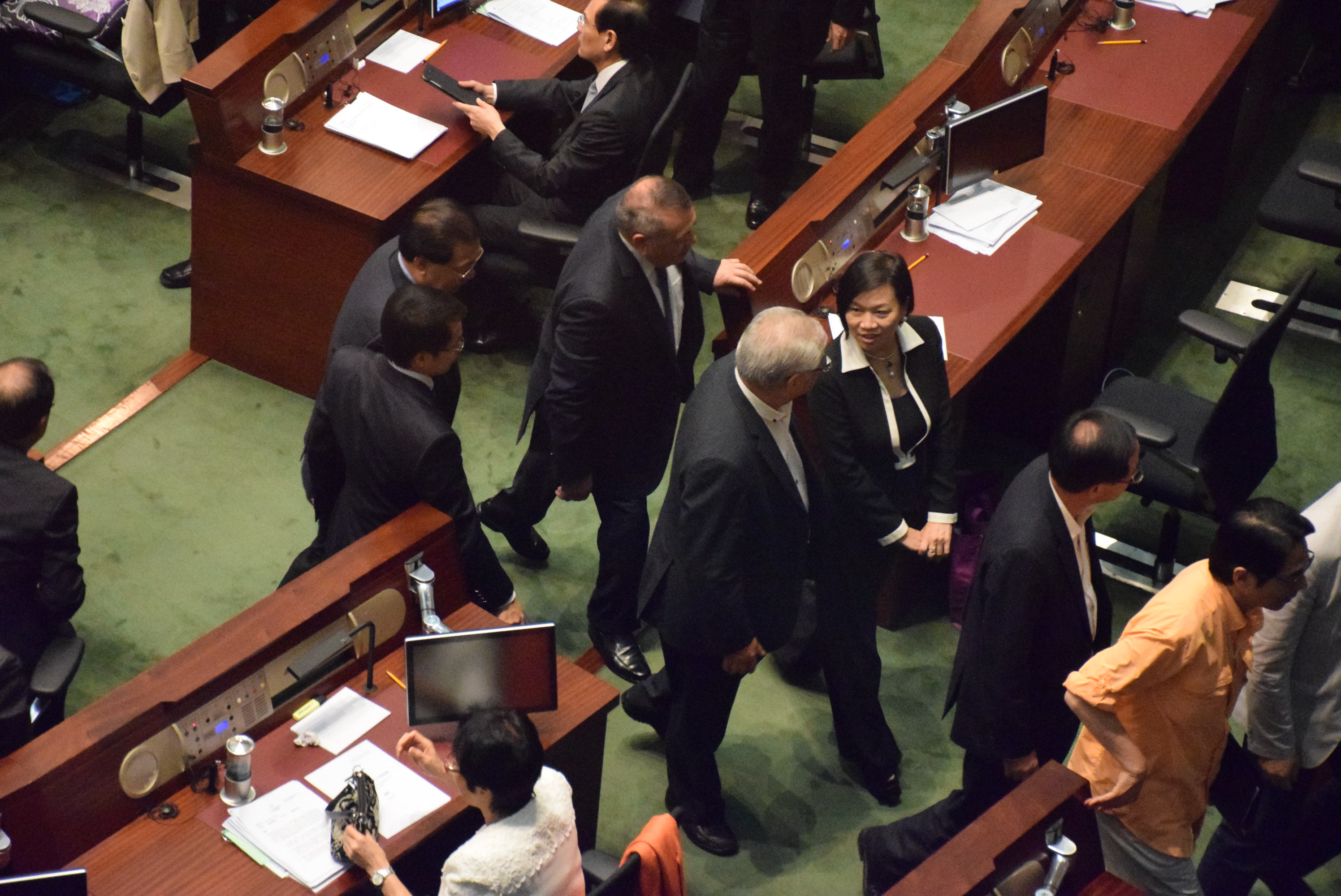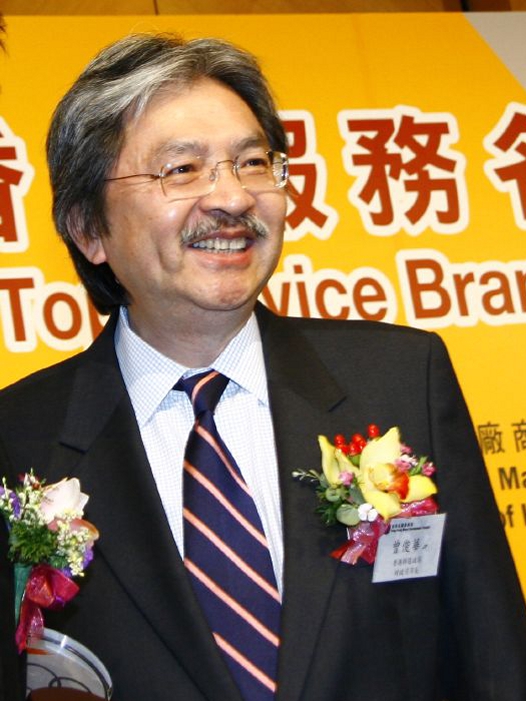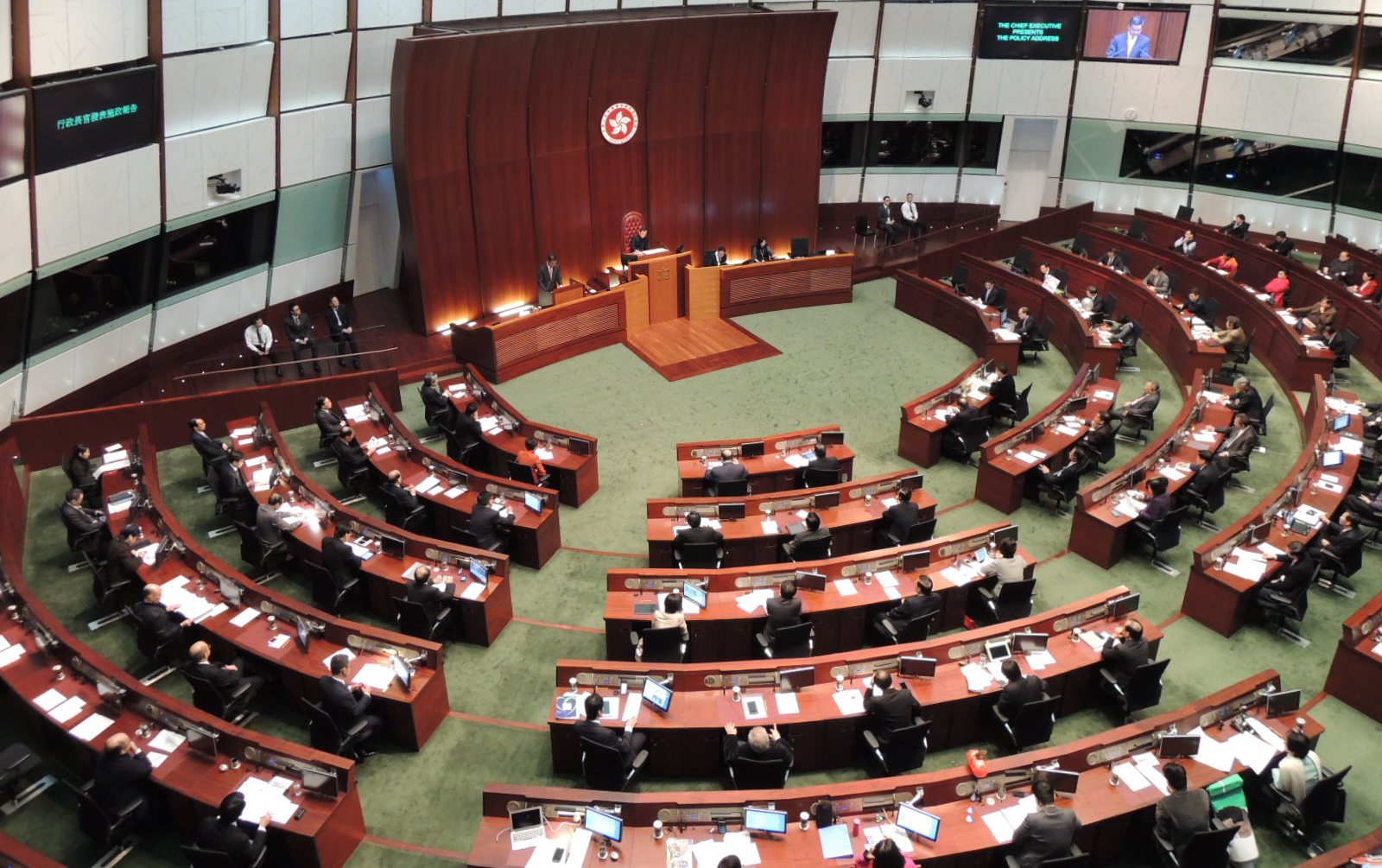|
5th Legislative Council Of Hong Kong
The Fifth Legislative Council of Hong Kong was the fifth meeting of the legislative branch of the Hong Kong Special Administrative Region Government. The membership of the LegCo is based on the 2012 election. The term of the session is from 1 October 2012 to 30 September 2016, during the term in office of the Chief Executive Leung Chun-ying. Due to the new arrangements agreed in a contentious LegCo vote in 2010, the session consists of the new total of 70 seats in LegCo, ten more than previously, with 35 members elected in geographical constituencies through direct elections, and 35 members in functional constituencies, in which five District Council (Second) functional constituency seats each represent all 18 District councils of Hong Kong voted for by all resident voters in Hong Kong (who did not have a vote in any other functional constituency). The Democratic Alliance for the Betterment and Progress of Hong Kong remained the largest party while the pan-democrats secured the ... [...More Info...] [...Related Items...] OR: [Wikipedia] [Google] [Baidu] |
Legislative Council Of Hong Kong
The Legislative Council of the Hong Kong Special Administrative Region (LegCo) is the unicameral legislature of Hong Kong. It sits under China's " one country, two systems" constitutional arrangement, and is the power centre of Hong Kong's hybrid representative democracy. The functions of the Legislative Council are to enact, amend or repeal laws; examine and approve budgets, taxation and public expenditure; and raise questions on the work of the government. In addition, the Legislative Council also has the power to endorse the appointment and removal of the judges of the Court of Final Appeal and the Chief Judge of the High Court, as well as the power to impeach the Chief Executive of Hong Kong. Following the 2019–2020 Hong Kong protests, the National People's Congress disqualified several opposition councilors and initiated electoral overhaul in 2021. The current Legislative Council consists of three groups of constituencies—geographical constituencies (GCs), ... [...More Info...] [...Related Items...] OR: [Wikipedia] [Google] [Baidu] |
People Power (Hong Kong)
People Power (PP) is a populist and radical democratic political party in Hong Kong. Formerly chaired by Raymond Chan, it belongs to the radical wing of the pro-democracy camp and currently holds one seat in the District Councils. People Power was founded in 2011 as a political coalition consisting of the defected League of Social Democrats (LSD) legislators Wong Yuk-man and Albert Chan and activists from the Power Voters, Democratic Alliance and The Frontier who aimed to "punish" the Democratic Party for its compromise with the Beijing authorities over the constitutional reform proposal in 2010. It filled 62 candidates in the 2011 District Council election, in which many of them stood against the Democrats, but only got one candidate elected. The party however ran a successful 2012 Legislative Council election by winning 10 per cent of the vote and gaining three seats in the Legislative Council. After Wong Yuk-man's faction left the party in 2013, People Power deve ... [...More Info...] [...Related Items...] OR: [Wikipedia] [Google] [Baidu] |
Jasper Tsang
Jasper Tsang Yok-sing ( zh, t=曾鈺成; born 17 May 1947) is a Hong Kong politician. He is the founding member of the largest pro-Beijing party the Democratic Alliance for the Betterment and Progress of Hong Kong (DAB) from 1992 to 2003 and the 2nd President of the Legislative Council from 2008 to 2016. Graduated from the University of Hong Kong, Tsang chose to teach in the leftist Pui Kiu Middle School and became its principal before he stepped into politics in the 1980s. In 1992 he founded the Democratic Alliance for the Betterment of Hong Kong and first contested in the 1995 Legislative Council election in which he lost the race. He was elected in Kowloon West in the first Legislative Council election after the handover of Hong Kong in 1998. He was also the member of the Executive Council from 2002 to 2008. He became the President of the Legislative Council in 2008. Due to his relatively fair and accommodating presiding styles and his relatively liberal image within t ... [...More Info...] [...Related Items...] OR: [Wikipedia] [Google] [Baidu] |
Appropriation Bill
An appropriation, also known as supply bill or spending bill, is a proposed law that authorizes the expenditure of government funds. It is a bill that sets money aside for specific spending. In some democracies, approval of the legislature is necessary for the government to spend money. In a Westminster parliamentary system, the defeat of an appropriation bill in a parliamentary vote generally necessitates either the resignation of a government or the calling of a general election. One of the more famous examples of the defeat of a supply bill was the 1975 Australian constitutional crisis, when the Senate, which was controlled by the opposition, refused to approve a package of appropriation and loan bills, prompting Governor-General Sir John Kerr to dismiss Prime Minister Gough Whitlam and appoint Malcolm Fraser as caretaker Prime Minister until the next election (where the Fraser government was elected). By country India An appropriation bill is a bill that authorizes the go ... [...More Info...] [...Related Items...] OR: [Wikipedia] [Google] [Baidu] |
Filibustering
A filibuster is a political procedure in which one or more members of a legislative body prolong debate on proposed legislation so as to delay or entirely prevent decision. It is sometimes referred to as "talking a bill to death" or "talking out a bill", and is characterized as a form of obstruction in a legislature or other decision-making body. Etymology The term "filibuster" ultimately derives from the Dutch ("freebooter", a pillaging and plundering adventurer), but the precise history of the word's borrowing into English is obscure.''Oxford English Dictionary'', "filibuster", pp. F:212–213. The ''Oxford English Dictionary'' finds its only known use in early modern English in a 1587 book describing "flibutors" who robbed supply convoys. In the late 18th century, the term was re-borrowed into English from its French form , a form that was used until the mid-19th century. The modern English form "filibuster" was borrowed in the early 1850s from the Spanish (lawless plunder ... [...More Info...] [...Related Items...] OR: [Wikipedia] [Google] [Baidu] |
League Of Social Democrats
The League of Social Democrats (LSD) is a social democratic party in Hong Kong. Chaired by Chan Po-ying, wife of Leung Kwok-hung, it positions itself as the radical wing of the pro-democracy camp (Hong Kong), pro-democracy camp and stresses on "street actions" and "parliamentary struggles". It currently holds two seats in the District councils of Hong Kong, District Councils. Established in 2006 by a group of pro-grassroots left-leaning activists, the party opposes the perceived moderate and compromising approach of its pro-democratic allies Democratic Party (Hong Kong), Democratic Party and Civic Party and called for more aggressive tactics to achieve democracy. It often found itself at odds with other pan-democrats due to its confrontational and radical activism in the Legislative Council of Hong Kong, Legislative Council. The party first participated in the 2008 Hong Kong legislative election, 2008 Legislative Council election and won over the 10 per cent of the popular vote ... [...More Info...] [...Related Items...] OR: [Wikipedia] [Google] [Baidu] |
John Tsang
John Tsang Chun-wah, GBM, JP (; born Mui; born 21 April 1951) is a Hong Kong former senior civil servant and government official who was the longest-serving Financial Secretary in the Special Administrative Region period to date. Born in Hong Kong and raised and educated in the United States, Tsang worked in the Hong Kong government for more than thirty years. He was the private secretary to the last colonial governor Chris Patten and was promoted to Secretary for Commerce, Industry and Technology in 2003. He worked as director of the Office of the Chief Executive under Donald Tsang administration from 2006 to 2007. In July 2007, he was appointed Financial Secretary by Donald Tsang. He proposed the Scheme $6,000 tax rebate to all Hong Kong residents in his 2011 Budget. He continued to serve in the Leung Chun-ying administration until January 2017, when he resigned to run in the 2017 Chief Executive election. Despite his lead in the opinion poll by large margin throughout ... [...More Info...] [...Related Items...] OR: [Wikipedia] [Google] [Baidu] |
Financial Secretary (Hong Kong)
The Financial Secretary () is the title held by the Hong Kong government minister who is responsible for all economic and financial matters (“Department of Finance” per Article 60 of the Basic Law). The position is among the three most senior Principal Officials of the Government, second only to the Chief Secretary in the order of precedence (but not subordinate to the CS). Together with other secretaries, the Financial Secretary is accountable to the Legislative Council and the Chief Executive (the Governor before the 1997 transfer of sovereignty) for his actions in supervising the formulation and implementation of financial and economic policies. The position evolved out of the office of the Colonial Treasurer before 1940. The Financial Secretary is a member of the Executive Council, and gives advice to the Chief Executive in that capacity. He is also responsible for delivering the annual budget to the Legislative Council. To date, it is the only office among the thr ... [...More Info...] [...Related Items...] OR: [Wikipedia] [Google] [Baidu] |
Policy Address
Policy Address () is the annual address by the Chief Executive of Hong Kong (Governor prior to the handover). The practice of giving annual policy address is mandated under Article 64 of the Basic Law, requiring the government to "present regular policy addresses to the Council". The policy address was first introduced during the colonial period by Governor Sir Murray MacLehose in 1972 as "Address by His Excellency the Governor". It was modelled after the Queen's Speech in the United Kingdom and aimed to strengthen the communications with Hong Kong residents after the Hong Kong 1967 Leftist riots. It used to be addressed in October, on the opening of the Legislative Council. In 2002, former Chief Executive Tung Chee-hwa changed it unilaterally to January, but it was returned to October by his successor, Donald Tsang. After Leung Chun-ying succeeded Tsang in 2012, he changed the policy address back to January. It was again changed back to October after Carrie Lam became Chief ... [...More Info...] [...Related Items...] OR: [Wikipedia] [Google] [Baidu] |
Pro-Beijing Camp (Hong Kong)
The pro-Beijing camp, pro-establishment camp, pro-government camp or pro-China camp refers to a political alignment in Hong Kong which generally supports the policies of the Beijing central government and the Chinese Communist Party (CCP) towards Hong Kong. The term "pro-establishment camp" is regularly in use to label the broader segment of the Hong Kong political arena which has the closer relationship with the establishment, namely the governments of the People's Republic of China (PRC) and the Hong Kong Special Administrative Region (HKSAR). It is also labeled as the "Patriotic Front" by the pro-Beijing media and sometimes labeled as "loyalists" by the rival pro-democracy camp. The pro-Beijing camp evolved from Hong Kong's pro-CCP faction, often called "leftists", which acted under the direction of the CCP. It launched the 1967 Hong Kong riots against British colonial rule in Hong Kong and had a long rivalry with the pro-Kuomintang bloc. After the Sino-British Joint De ... [...More Info...] [...Related Items...] OR: [Wikipedia] [Google] [Baidu] |
Leung Chun-ying
Leung Chun-ying (; born 12 August 1954), also known as CY Leung, is a Hong Kong politician and chartered surveyor, who has served as vice-chairman of the National Committee of the Chinese People's Political Consultative Conference since March 2017. He was previously the third Chief Executive of Hong Kong between 2012 and 2017. A surveyor by profession, Leung entered politics when he joined the Hong Kong Basic Law Consultative Committee (HKBLCC) in 1985 and became its secretary-general in 1988. In 1999, he was appointed the convenor of the Executive Council of Hong Kong, a position he held until 2011, when he resigned to run in the 2012 Chief Executive election. Initially regarded as the underdog, Leung ran a successful campaign against front-runner Henry Tang, receiving 689 votes from the Election Committee and with the support of the Liaison Office. At the beginning of his administration, Leung faced the anti-Moral and National Education protests and the Hong Kong Telev ... [...More Info...] [...Related Items...] OR: [Wikipedia] [Google] [Baidu] |
Wu Chi-wai
Wu Chi-wai, MH (, born 18 October 1962) is a Hong Kong politician. He is the former chairman of the Democratic Party from 2016 to 2020 and a former member of the Legislative Council of Hong Kong for Kowloon East constituency since 2012. He has also been a member of Wong Tai Sin District Council since 1999 and member of the Urban Council from 1995 to 1999. Education and early career Wu was born in Hong Kong in 1962 to a grassroots family who had been living in the squatter areas of Kowloon Walled City, Shun Lee Estate, and Wong Tai Sin. He was educated at the Queen's College, Hong Kong and went into social work after he graduated in 1981. He furthered his education at the University of Wisconsin–Milwaukee and obtained a master's degree in Economics in 1991. Subsequently, Wu returned to Hong Kong and worked as an assistant for Legislative Councillor Conrad Lam, who was a member of the pro-democracy party United Democrats of Hong Kong, which later transformed into the Democ ... [...More Info...] [...Related Items...] OR: [Wikipedia] [Google] [Baidu] |


.png)


